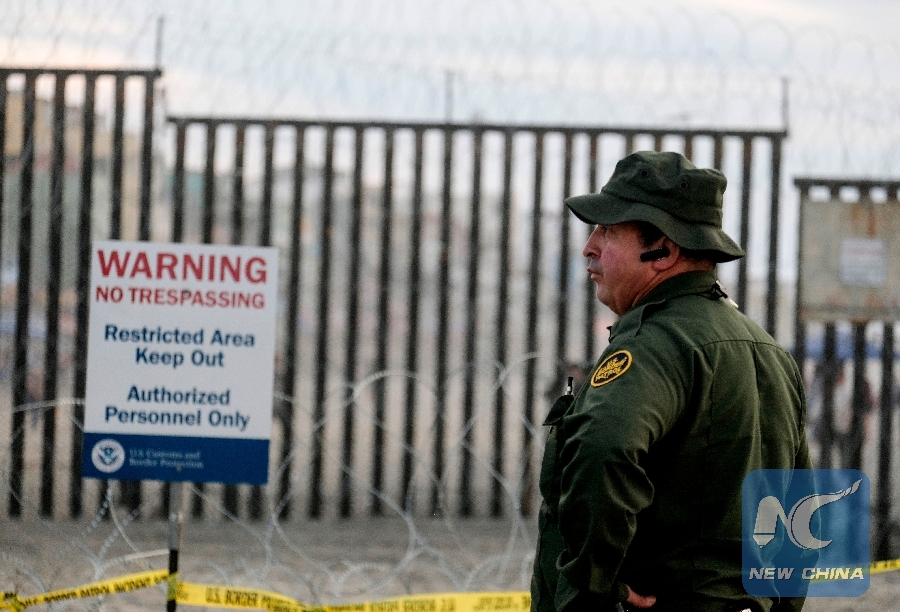
File Photo: A U.S. Border Patrol agent stands in front of the border fence that divides the U.S. and Mexico in San Diego, California, the United States, Nov. 17, 2018. (Xinhua/Zhao Hanrong)
WASHINGTON, May 30 (Xinhua) -- U.S. President Donald Trump on Thursday said he would impose a new 5-percent tariff on all imported Mexican goods beginning June 10 so as to pressure the country to halt undocumented migrants crossing the border, a move that worries many.
"On June 10th, the United States will impose a 5% Tariff on all goods coming into our Country from Mexico, until such time as illegal migrants coming through Mexico, and into our Country, STOP," Trump tweeted.
In a statement released Thursday evening, the White House said if the situation on the U.S.-Mexico border is not improved, the tariffs will be raised to 10 percent on July 1, 2019.
If Mexico still has not taken action to dramatically reduce or eliminate the number of illegal aliens crossing its territory into the United States, tariffs will be increased to 15 percent on Aug. 1, to 20 percent on Sept. 1, and to 25 percent on Oct. 1, the statement added.
"Tariffs will permanently remain at the 25 percent level unless and until Mexico substantially stops the illegal inflow of aliens coming through its territory," the statement said.
Dow futures dropped some 200 points on Thursday evening after Trump's announcement. S&P 500 futures fell 0.8 percent and Nasdaq futures were down 0.9 percent.
The escalation of the White House's already tough immigration policy could jeopardize the pending United States-Mexico-Canada Agreement, which preserves ultralow tariffs an earlier deal put into place, many local analysts say.
Earlier on Thursday, the White House sent a draft of "Statement of Administrative Action" to Congress, clearing the way for the administration to submit an enforcement bill to Congress after 30 days, which in turn starts a 90-day clock for an up-or-down vote on the trade deal.
If the tariff comes to pass, Mexico "should respond in a forceful way," said Jesus Seade, the trade negotiator for Mexican President Andres Manuel Lopez Obrador, on Thursday.
However, it is important to find out whether these tariffs are "really on the table," Seade added, noting that if Trump is serious, the move is bad for "two countries that are trying to arrive at a marvelous free trade treaty, the best in history, according to President Trump."
Investors also fear the tit-for-tat tariffs, as well as threats of non-tariff retaliation, will slow economic growth, hurt consumer confidence, and derail business investment.
About 6 million U.S. jobs depend on trade with Mexico, according to the U.S. Chamber of Commerce. Mexico was the second-biggest importer of goods into the United States in 2018. Many U.S. companies rely on Mexico as a central part of their supply chains.
Trump has repeatedly threatened Mexico with tariffs in the past. In April, he threatened to place a 25 percent tariff on Mexican cars if the country would not take action to stem the flow of migrants. He walked back afterwards.
He has told his advisers that he likes tariffs because they can take effect immediately and unilaterally, according to The New York Times.
"I am a Tariff Man," Trump tweeted in December 2018. "When people or countries come in to raid the great wealth of our Nation, I want them to pay for the privilege of doing so. It will always be the best way to max out our economic power."
The U.S. Customs and Border Protection turned away or apprehended more than 103,000 migrants at the U.S.-Mexico Border in March, the highest in the past six years.

